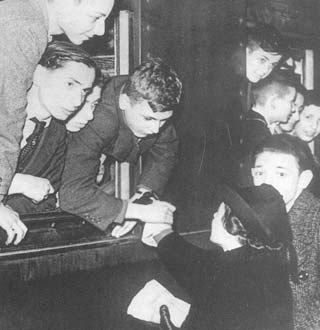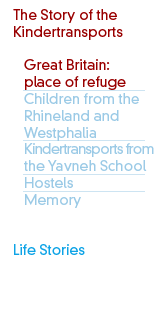|
||||
The story of the ‘Kindertransporte’ (Kindertransports)10,000 children
The Kindertransport to Great Britain was started after there had been reports in the press about the pogroms of the 9th and 10th November 1938 when synagogues all over Germany had been set on fire, shops and apartments damaged, and Jewish men, women and children maltreated. About 30,000 men, amongst them many young people, were deported to concentration camps. The general public in Europe and the United States was scandalised. Christian and other groups supported Jewish organisations in their efforts to organise help for those people. In the UK, the ‘Movement for the Care of Children from Germany’ was founded. At a later stage this became the ‘Refugee Children's Movement’, which took over most of the relevant organisational tasks. As early as 21st November 1938, the British Parliament decided to allow unaccompanied Jewish children from Germany to enter Britain on collective visas. Over the BBC, families were asked to house a child from Germany. Organisation in Germany and Great Britain
In Germany, the Department of Children's Emigration in the Reich’s Association of Jews in Germany (“Reichsvertretung der Juden in Deutschland“) and the local Jewish communities took over the responsibility for organising departures. The appropriate denominational relief agencies were responsible for children of Jewish families baptised as Protestants or Catholics. The Quakers in Berlin, Vienna and London helped to arrange the emigration of non-denominational, but also Christian and Jewish children.
|
 The first stage of the Kindertransports: the Netherlands. Werner Blumenthal and Kurt Eisenberg from Herne and Röhlinghausen, November 1938. |

|
||
 |
||||